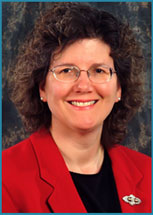
Susan Landahl: Providing Power to Millions
Susan Landahl, chief operating officer and senior vice president at Exelon Nuclear in Warrenville, Ill., has operational responsibility for roughly 20 percent of all US nuclear power-generating capacity – 17 nuclear plants in three states with total capacity of about 18 gigawatts. The job requires an ever-shifting mix of technical, management, communication and operational skills, and embodies one of the grand challenges of engineering: making a complex system dependable enough to be a daily resource for millions of people.
Landahl gravitated to the nuclear field in high school, "partly because the technology sounded great, and partly because I had family experience with radiation treatments." Her five-year BS/MS co-op program at NSE gave her hands-on experience outside the Institute, and during her sixth year she became the first NSE master's student to have a concentration in Health Physics, through a joint program with the Harvard School of Public Health.
This combination of nuts-and-bolts engineering with health physics, which focuses on the protection of people from the hazards of radiation, "definitely influenced my career," says Landahl. "Understanding the impact of radiation has really helped me, both in operations, and in communicating with the public."
Like many nuclear engineers, Landahl wanted to run a reactor, and she earned her Senior Reactor Operator license in 1998. At the time, she was one of very few women in the country to have that status, and she is still an unusual presence in the male-dominated nuclear and utility fields. But rather than being a hardship, Landahl says this has proved to be "a great advantage" in her career.
"Everyone remembers you," she explains. "It's not unusual for me to be the only woman at an industry meeting. People get to know you very quickly, and when people know each other, it's easier to pick up the phone and offer help or seek knowledge."
Landahl credits some of her approach to her time at MIT, which "taught me how to think, and how to solve problems methodically. I'm very confident that if I don't know something, I know how to go figure it out – to reference the right data, talk to the right people, put the right people together. You never want to make decisions in a vacuum when information is available."
The timing of Landahl's arrival in the nuclear industry in the 1980s, and her ascent from operator to a series of company leadership positions, was counter-cyclical. While the industry offered strong career options from the 1950s into the 1970s, subsequent employment conditions were less favorable, with fewer new engineers entering the field. As a result, says Landahl, the nuclear sector has an older engineering workforce, with almost half eligible for retirement over the coming decade.
"This is a fantastic time to get into the industry, a watershed transition from one generation to another," Landahl points out. "The US is building its first new nuclear plant in many years – it's well under way in Georgia. And Exelon and other utilities are up-rating plants, making physical modifications to enable them to generate more electricity very economically."
In addition to utilities, architectural and consulting firms that work overseas are hiring, and Landahl says that engineering is the most broadly applicable degree type. "We have engineers who design, engineers who run maintenance, engineers who are operators, and engineers like me who run large parts of the company. It's an opportunity to apply your education to something important and see a result."
That's something Landahl continues to aspire to each day. "The best thing I can do is to make sure the plants keep running safely and well," she says. "That's my focus."
“This is a fantastic time to get into the industry, a watershed transition from one generation to another... We have engineers who design, engineers who run maintenance, engineers who are operators, and engineers like me who run large parts of the company. It's an opportunity to apply your education to something important and see a result.”
Written by Peter Dunn
